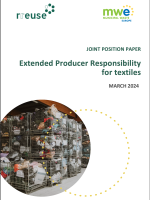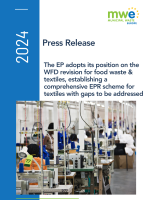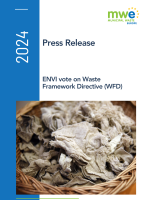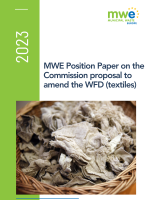Proposals for Amendments and Support for the draft report “On resource efficiency: Moving towards a Circular Economy” from MEP Sirpa Pietikäinen
AMENDMENTS
Thanking Ms. Sirpa Pietikäinen MEP for her excellent report and forward thinking, Municipal Waste Europe hereby submits the following proposals for amendments, with a view to further enhancing its practicability.
Proposed in the draft report |
Article 4, p. 9 Extended producer responsibility means that producers are responsible for the end-of-life management of their products. Retailers could be considered to only sell the services provided by the products – the product remains in the producers’ ownership, and at the end of its life, it is their responsibility to manage the product in accordance with existing regulations
|
Amendment |
New text: Extended producer responsibility means that producers are responsible for the end-of-life management of their products. Retailers could be considered to only sell the services provided by the products – the product remains in the producers’ ownership, and at the end of its life, it is their responsibility to manage the product in accordance with existing regulations, and in cooperation with municipalities for the collection of their products from the municipal waste stream |
Justification
Referring to the municipal waste stream, this paragraph must mention the Services of General Interest that municipalities provide to their citizens, in ensuring that their waste is collected and treated in accordance with European and national legislation. Consumer waste is dispersed throughout the various households and businesses which the municipality is responsible for. Through a functioning and controlled EPR system, business and municipalities can coordinate the separate collection of their waste, providing a quality source of materials and thereby creating security of supply to the market, which in turn gives impetus to the creation of the circular economy.
Proposed in the draft report
| ||
Article 12, p. 5 Urges the Commission to take other relevant actions to ensure that 3products are easy to reuse, refit, repair, recycle and eventually dismantle for new resources; | ||
Amendment
| ||
New text: Urges the Commission to take other relevant actions to ensure that products are easy to reuse, refit, repair, recycle and | ||
Justification
The use of the word ‘eventually’ is unnecessary and can be misinterpreted in the implementation phase. It is not necessary to explain that dismantling will occur after all possible cycles of repair, refitting and re-use have been exhausted.
Proposed in the draft report
|
Article 14, p. 5 Urges the Commission to submit the announced proposal on the review of waste legislation by the end of 2015 and to include the following points: setting extended producer responsibility requirements; endorsing the ‘pay-as-you-throwprinciple’ prioritising separate collection schemes in order to facilitate the development of business based on the reuse of secondary raw materials; increasing recycling targets to at least 70 % of municipal solid waste, based on the output of recycling facilities, using the same harmonised method for all Member States with externally verified statistics; introducing a ban on landfilling recyclable and biodegradable waste by 2025 and a ban on all landfilling by 2030; introducing fees on landfilling and incineration; (p. 5)
|
Amendment
|
New text: Urges the Commission to submit the announced proposal on the review of waste legislation by the end of 2015 and to include the following points: setting extended producer responsibility requirements; endorsing the ‘pay-as-you-throwprinciple’ prioritising separate collection schemes in order to facilitate the development of business based on the reuse of secondary raw materials; increasing recycling targets |
Justification
Without reliable data on current real recycling rates, it is not possible to set absolute targets. In order for Member States not to lose momentum, aspirational targets could be adopted in this revision. ‘On all waste’ : this is a request that the Waste Framework Directive addresses all waste as is intended, and not only municipal waste. If commerce and industry is required to report their waste and recycled quantities, a much greater proportion of the overall waste stream (not only municipal waste) will be addressed. Also, this reporting is necessary to ensure that all national definitions of municipal waste agree at European level when statistics are added and compared. ‘Calculating recycled quantities based on the same definitions of municipal waste and recycling’: in order to ensure harmonised implementation of the Directive as well as the comparability of waste statistics at EU level, there must be one calculation method for determining recycling rates and this must be based on the same understanding of what is meant by ‘municipal waste’ and ‘recycling’. Both definitions must be in the Framework Directive and either repeated or referred to by the daughter directives. Banning landfilling raised considerable concern amongst numerous Member States, whereas progressive reduction targets can provide a step-wise, less abrupt method for achieving the aim of limiting landfilling, over time, to the residues of waste treatment. The EU level cannot implement fees therefore we do not see the value in including a request for them here.
Proposed in the draft report
|
Article 15, p. 5: Calls on the Commission to propose a regulatory framework for urban mining in existing landfills and to develop an environmental permit system for the recycling industry based on self-monitoring and external auditing; |
Amendment
|
New text: Calls on the Commission to propose a regulatory framework for urban mining and landfill mining |
Justification
Urban mining and landfill mining are separate activities. Urban mining can happen in abandoned buildings/city-areas, while landfill mining happens at landfills. A regulatory framework would be helpful in both cases.
Proposed in the draft report
|
Article 20, p. 6 Urges the Commission to propose compulsory green public procurement procedures; considers that reused, repaired, remanufactured, refurbished and other resource-efficient products and solutions are to be preferred in all public procurement, and if they are not preferred, the ‘comply or explain’ principle should apply; |
Amendment
|
New text: Urges the Commission to encourage |
Justification
This requirement is not in line with current European public procurement or competition legislation. Rather than requiring compulsory green public procurement procedures, there should be measures to actively encourage or facilitate green public procurement.
Proposed in the draft report
|
Article 23, p. 6 Calls on the Commission to establish a permanent resource-efficiency platform to encourage and facilitate the application of the latest research findings, the exchange of best practices and the emergence of new industrial synthesis and industrial ecosystems; (p.6)
|
Amendment
|
New text: Calls on the Commission to establish a permanent resource-efficiency platform which includes representatives from all sectors of the economy, both public and private and civil society to encourage and facilitate the application of the latest research findings, the exchange of best practices and the emergence of new industrial synthesis and industrial ecosystems; |
Justification
The previous resource-efficiency platform membership was made up of primarily representatives of multinational enterprises. Any future platform should be an equal mix of large enterprises, SMEs, representatives of municipalities, regions and Member States and NGOs. Without this, a balanced approach to resource-efficiency cannot be assured.
Proposed in the draft report
|
Article 26, p. 6 Urges the Commission to examine whether existing legislation is hindering the circular economy or the emergence of new business models, such as a lease economy; (p.6) |
Amendment
|
New text: Urges the Commission to examine whether existing European legislation is hindering the circular economy or the emergence of new business models, such as a lease economy, e.g. competition law; |
Justification
The legislation referred to here is European therefore it must be clear. Competition law can get in the way of innovative ideas which change the structure of the economy and this should be taken into account by any forward-planning document on the creation of a circular economy.
Municipal Waste Europe Supports the following Articles in the report, in particular
Article 6, p. 4
Urges the Commission to develop and introduce by 2019 a lead indicator and a number of subindicators on resource efficiency, including ecosystem services; these binding indicators should measure resource consumption, including imports and exports, at EU Member State and industry level and take account of the whole lifecycle of products and services;
Article 7, p. 5
Urges the Commission to set a binding target to increase resource efficiency at EU level by 30 % by
2030 and individual targets for each Member State;
Article 8, p.5
Urges the Commission to promote the use of resource-efficiency indicators through international conventions;
Article 10, p. 5
10. Points out that the amount of resources used by a product over its lifetime is largely determined during the design phase;
Article 21, p. 6
21. Urges the Commission to develop a policy framework on nutrients in order to enhance recycling, foster innovation, improve market conditions and mainstream their sustainable use in EU legislation on fertilisers, food, water and waste;
Article 25, p. 6
25. Stresses that all EU funding, including funding through EFSI, Horizon 2020, cohesion funds and the EIB, must be mobilised to promote resource efficiency and urges the Commission to abolish all environmentally harmful subsidies;
Article 8, p. 8
This is a win-win scenario. Resource efficiency is a solution to the ecological dilemma we are faced with and to the economic challenges Europe is struggling with.
Article 9, p.8
Increasing resource efficiency is based on six core concepts: circular economy, cascading use of resources, waste hierarchy, extended producer responsibility, industrial symbiosis and new business models.
Articles 6-7-8, p. 12
A clear new policy framework is also needed to enable private and institutional investors to change their investment paradigm towards long-term sustainable investments. Policy makers must deliver the necessary legal certainty for resource-efficient investments and business strategies to be created. Instead of a contradiction, there are mutual interests and benefits between business and the environment. The tension in all industries is between companies that base their business on innovation and resource efficiency and those that are locked into policies and market conditions shaped for past conditions.
European reindustrialisation can be based only on resource-efficient and innovative businesses. The change has to start urgently to avoid getting locked into resource-inefficient structures




